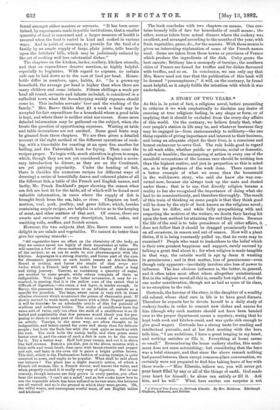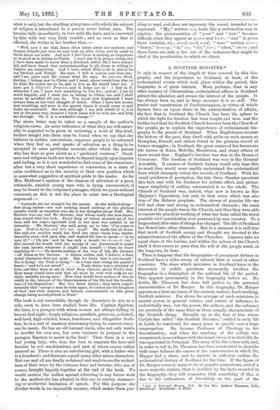A STORY OF TWO YEARS.* As this is, in point
of fact, a religious novel, before proceeding to criticise it we wish emphatically to disclaim any desire of sneering at true religions feeling, in any shape or form, or of implying that it should be excluded from the every-day affairs of this world. On the contrary, we believe firmly that, what- ever people's station in life may be, and whatever business they may be engaged in—from statesmanship to millinery—the one thing capable of giving importance and interest to their business, and being an adequate object for their lives, is a conscious and honest endeavour to serve God. The rule holds good in regard to all work alike, whether public or private, social or domestic, exalted or humble ; the mainspring of action in every one of the manifold occupations of the human race should be nothing less than the highest motive, and just in proportion as this is acted on, so is the goodness of the work done. There cannot be a better example of what we mean than the housemaid in the well-known story, who said she knew she was•con- verted now, because she always took up the mats and dusted under them ; that is to say, that directly religion became a reality to her she recognised the importance of doing what she had to do conscientiously, and therefore thoroughly. The result of this train of thinking on some people is that they think good will be done by the style of book known as the religious novel ; but here we differ, and while fully sympathising with and respecting the motives of the writers, we doubt their having hit upon the best method for attaining the end they desire. Because the life of the soul is to take precedence of all other affairs, it does not follow that it should be dragged prominently forward on all occasions, in season and out of season. How will a plant thrive, if it is being constantly pulled np, that its roots may be examined P People who want to lead.others to the belief which is their own greatest happiness and support, rarely succeed by talking a great deal about it ; for when religion is made tangible in that way, the outside world is apt ty• deem it wanting in genuineness ; and in that matter, loss of genuineness—even though only apparent—inevitably involves also loss of power to influence. The less obvious influence is, the better, in general, and it often takes most effect where altogether unintentional. But in the religious novel all this is, usually lost sight of, and the one under consideration, though not as bad as some of its class, is no exception to the rule.
Gertrude, the heroine of the story, is the daughter of a wealthy old colonel, whose chief care in life is to have good dinners. Therefore he expects her to devote herself to a daily study of cookery-books, in order to concoct new dishes and sauces for him (though why such matters should not have been handed over to the proper department seems a mystery, seeing that he kept both cook and kitchen-maid, and was quite rich enough to give good wages). Gertrude has a strong taste for reading and intellectual pursuits, and at her first meeting with the hero tells him, " I am ambitious, I have a great longing in my heart, and nothing satisfies or fills it. Everything at home seems so small." Remembering the home cookery studies, this senti- ment does not seem astonishing ; but considering that the hero was a total stranger, and that since the above remark nothing had passed between them except common-place conversation, we certainly were not prepared to find him taking leave of her with these words :—" Miss Ellerslie, believe me, you will never get your heart filled by any or all of the things of earth. God made your heart for himself ; he alone can satisfy or fill it. Ask him, and be will." What here excites our surprise is not
* A Story of Two Years : or, Gertrude Ellerslie. By Mrs. Meldrnm. Edinburgh Oliphant, Anderson, and Ferrier.
what is said, but the startling abruptness with which the subject of religion is introduced to a person never before seen. The heroine falls immediately in love with the hero, and is converted by him with but very little trouble ; and as soon as that is effected, she writes to her brother thus :—
" Well, now I see that Jesus often takes away our mothers and dearest friends just that we may look up after them, and be made to think about our souls. And now I feel there is nothing so important or so good as to belong to Christ. I can't put it in proper words, but I have been made to know what a frivolous, selfish life I have always led, and have found that, notwithstanding it all, Jesus is willing to forgive me everything. And I have asked Him to do it, and to be my Saviour and Friend. He says, 'I will in nowise cast thee out,' and I am quite stare He means What He says. So you see, Fred, darling, I belong now to Christ, and I want, above everything else, to be what He wants me to be, and to live as He would have me. I have got a Pilgrim's Progress, and it helps me so ! I feel as if, wherever I am, I have now something to live for ; and oh ! I am so much happier, and I want you, to belong to Christ too, and I shall never be satisfied till you do. You know bow frightened I have always been at the very thought of death, Often I have lain awake just trembling, and even in the gayest times it would come in and make me miserable. But now, although I am still afraid of it, it is not in the same way, because I know Jesus will be with me, and help me through. Oh, it is a wonderful change !"
The above letter may be taken as a sample of the author's religious views. As some indication of what they are will natur- ally be expected to be given in reviewing a work of this kind, further insight into them may be found when we say that she believes in sudden conversions, supposes people to be reformed when they feel so, and speaks of salvation as a thing to be accepted at some particular moment, after which the person who has done so goes about as a " pardoned creature." Good- ness and religious faith are made to depend largely upon impulse and feeling, so it is not wonderful to find some of the characters, after but a very short experience of conversion, in a state of .calm confidence as to the security of their own position which is somewhat suggestive of spiritual pride to the reader. As for Mrs. Meldram's opinion of the chances of salvation of a good, estimable, amiable young man who is dying unconverted, it may be found in the subjoined passages, which we quote without comment, as this is not the place to enter into a theological argument :-
" Gertrude set out straight for the manse. As she walked along— flew along rather—she saw nothing, heard nothing of the glorious outside world, so absorbed was she in her thoughts about Fred. Mrs. Stewart was out, and Mr. Stewart, into whose study she was shown, was scared with her look. Every drop of colour seemed out of her face, and the eager, agonised look in her eyes was painful in its intensity. Mr. Stewart,' she said, going up to him, ' I've come to you. Fred is dying, and he's not saved.' He made her sit down. She said not another word, but fixed her eyes—those true, tender, beautiful eyes—full upon him, and waited for him to speak.—' Is he very ill P'—' Oh yes ! and he has only a month to—t—o—l—ive !' She uttered the words with the energy of one determined to make the case known, whatever it might cost herself.—' Does he know anything of—'—' He knows nothing of the way of life, Mr. Stewart —of Jesus as his Saviour. A dearer, nobler, and, I believe, a finer moral character does not exist. Bat we know that is not enough ! He is dying ! my Fred is dying !'—in a tone that wrung the pastor's
heart—' and hes not saved !' Truly theirs was a ministry of love, and they were as one in their deep concern about Fred's soul. How many would have said that all must be well with such an up- right, amiable young man ! How they would have spoken of him as ready to die, because of the blamelessness of his life and the lovable- ness of his disposition ! But they knew better ; they knew experi- mentally that except a man be born again, he cannot see the kingdom of God,' and their prayers and labours concentrated on this great -change being accomplished in Fred."
'The book is not unreadable, though its characters do not, as a rule, seem to have been studied from life. Captain Egerton, the hero, is a paragon with whom women are always falling in love at first sight ; deeply religious, unselfish, generous, polished, well-bred, high-minded, brave, handsome, and altogether fault- less, he is a sort of amateur missionary trying to convert every- one he meets. He has an old baronet uncle, who not only wants to murder his own son, but even ventures to propose to the paragon Egerton to assist in the deed ! Then there is a very bad young lady, who does her best to separate the hero and heroine by evil machinations, and part of whose course rather amused us. There is also an unbelieving.girl, with a father who is a drunkard ; and there are a good many other minor characters. But one and all are finally reclaimed and made to see the wicked- ness of their ways by the virtuous hero and heroine, who are, of course, brought happily together at the end of the book. We would caution the author against returning in any future work to the method she has adopted in this one to convey stammer- ing or accidental hesitation of speech. For this purpose she divides words in an impossible manner, which makes them puz- zling to read, and does not represent the sound intended to be expressed. "My," written m-y, looks like a subtraction sum in algebra; the pronunciation of "your" and " how " becomes difficult, when they appear as yo-u-r and ho-w; " and" is given three varieties, viz., a-n-d, an-d, a-nd ; " were " written we-re; " heavy," he-a-vy ; "is," i-s ; " for," fo-r ; " when," wit-en ; and these forms are only a few out of the instances that might be cited of the peculiarities to which we object.



































 Previous page
Previous page